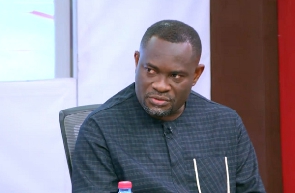 John Kumah, Deputy Minister of Finance and MP for Ejisu
John Kumah, Deputy Minister of Finance and MP for Ejisu
Deputy Minister of Finance, John Kumah, has underscored the enormity of the economic challenge that government is currently faced with and has thus urged institutional bondholders to sign on to the current domestic debt exchange proposed by government.
Kumah told Joy FM on Tuesday, December 6; that the consequences for those who reject the measure will be dire, adding that even in the event that they sue government, chances are that they will still record worse outcomes.
Asked about how government was upbeat about the acceptability of the exchange, he responded: “Initially, some will express reservations but when you explain to them the enormity of the problem, and where we are and how we can all get out better, most of them agree…
On the issue of institutions that refuse to sign on, he cautioned; “then you don’t get the carrots, the benefits, the buffers that are provided. You are on your own, it means that you are open to default in terms of if the markets are unable to redeem (the bonds).”
He confirmed that there was a 10-day window for necessary bondholders to take advantage of the process that starts on December 6, a day after Minister of Finance Ken Ofori-Atta announced terms of the debt operation.
When the question of government being sued by institutions was raised, he responded by saying that if the system is broken or in the case of an economic crash, there will be little to nothing to sue for.
Government might have overborrowed - Kumah admits
“We are not a perfect institution. We can make mistakes, and our decisions are allowed to be criticised,” he said on the Joy FM Super Morning Show in response to public criticism over management of the economy.
Kumah, who is also Member of Parliament for Ejisu, added that the current state of the economy was also due to after effects of the COVID-19 pandemic, even though there has been some improvements since then.
The government has come in for backlash after it announced a domestic debt exchange for institutional bondholders as part of measures to secure an International Monetary Fund, IMF, programme before the end of the year.
The debt exchange has received stiff fightback especially from a number of institutions including the Trades Union Congress (TUC) and the Ghana Medical Association (GMA) who are insisting that the debt exchange should not affect pensions.
The deputy minister in the same interview also spoke about how excessive borrowing could have triggered the current economic crisis.
According to him, the government could have considered other alternatives to financing its projects and programmes aside from borrowing.
“Maybe the levels of borrowing have been too much and that could be one of the areas. Maybe we should have looked at more alternatives for financing our various programmes but of course, every nation is built on debt, it is what you do with it and what happens [that matters].
“I know we are where we are because, if you borrowed in 2017, 2018 and 2019, US$3 billion of investment each year and you were expecting the returns after 2020 and Covid-19 struck, and brought your economy to almost zero, it means that you are already in a very difficult situation.
“So, this is the reality of what happened, it’s not like we borrowed and did things that didn’t benefit the country,” he added.
Minister of Finance, Ken Ofori-Atta, on December announced a number of measures under the government's Domestic Debt Exchange (DDE) programme.
He said the announcement was in line with the government's Debt Sustainability Analysis as contained in the 2023 budget he presented to Parliament on November 24.
GhanaWeb Excellence Awards nominees reveal video
SARA